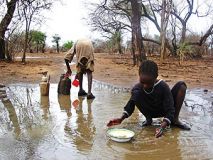Floods render Darfuris homeless again
KHARTOUM, Aug 15 (Reuters) – About 13,000 refugees have been made homeless by floods in Sudan’s troubled Darfur region, in the worst rains for half a century, a government official said on Monday.

|
|
Internally displaced Sudanese children from Mahli village in southern Darfur region collect rainwater to be used for drinking and cooking as they now live in an improvised refugee camp near Jaach village, northern Awil county in southern Sudan, April 26, 2005. 5Reuters). |
El-Fatih Abdel Aziz, the government’s manager of Abou Shouk camp in North Darfur, told Reuters the heaviest rains seen in decades had damaged a dam built to prevent flooding in the camp next to the state’s main town, el-Fasher.
“This dam… was damaged because of the heavy rain at night, and after that half of the camp was flooded,” he told Reuters from Darfur. “The government intervened and gave every family blankets and corn.”
He added non-governmental organisations working in the camp were to meet to decide whether to transfer the 13,000 displaced to another camp. Abou Shouk, just outside el-Fasher, houses about 50,000 Darfuris.
About 2 million Darfuris fled to makeshift camps in the remote region during more than 2-1/2 years of rebellion by non-Arab rebels against the Islamist central government.
Tens of thousands have been killed in the violence, and the International Criminal Court is investigating alleged war crimes committed during the uprising.
The rebels accuse the Arab-dominated Khartoum government of neglect and of arming Arab militias who now stand accused of a widespread campaign of rape, looting and burning of non-Arab villages. The conflict has been aggravated by competing herders and farmers over scarce resources due to desertification.
Abdel Aziz said the last time it rained like this in Darfur was more than 50 years ago. Last year, aid agencies were worried because the lack of rain meant much of the harvest in Darfur was lost.
“In one night we had 132 millimetres of rain…in the whole of last year we had 106 millimetres,” he said. “It is impossible for a town like el-Fasher to absorb this water,” he said. He added about 2,000 families were also homeless in the town.
